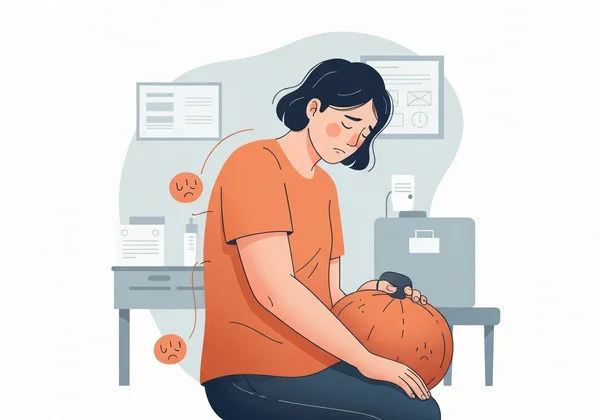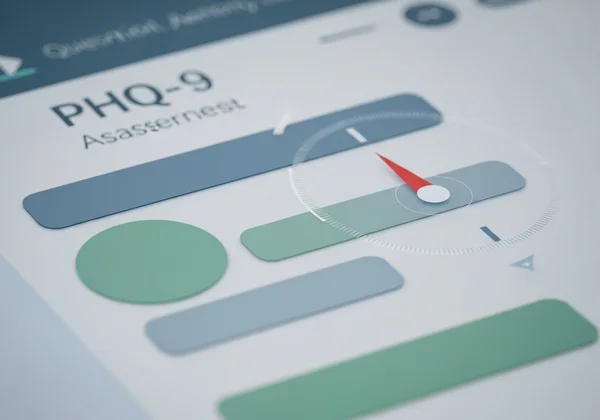PHQ-9 for Chronic Illness: Monitor Mental Health
September 29, 2025 | By Clara Holloway
Living with a chronic illness is a journey that demands incredible strength. You become an expert in managing physical symptoms, navigating doctor's appointments, and adapting your daily life. But often, there's an unseen challenge that walks hand-in-hand with physical health: the toll on your emotional well-being. This guide is for you. We'll explore the deep connection between chronic conditions and mental health, and introduce a simple, effective tool to help you stay in tune with your emotional state. If you've ever wondered, how do physical symptoms impact mental health?, you are in the right place to find answers and a clear path forward.

The Patient Health Questionnaire-9, or PHQ-9, is a confidential and widely respected tool used to screen for depressive symptoms. It’s not a diagnosis, but rather a personal emotional check-up that provides valuable insights. By taking a few minutes to complete a free PHQ-9 assessment, you can gain a clearer understanding of your mood and take a proactive first step toward integrated well-being.
The Unseen Link: Chronic Illness and Depression
Managing a long-term health condition is more than a physical battle; it’s an emotional one, too. The constant demands of your illness can create a fertile ground for feelings of sadness, frustration, and exhaustion to take root. Understanding this connection is the first step toward addressing it effectively. This is where a focus on depression and chronic illness becomes essential for comprehensive care.
Understanding Comorbid Depression in Chronic Conditions
When depression occurs alongside another medical illness, it's referred to as comorbid depression. This is not a sign of weakness; it's a recognized medical reality. The relationship is often bidirectional: chronic pain, fatigue, and inflammation can alter brain chemistry and contribute to depressive symptoms. Conversely, depression can worsen physical symptoms, lower your pain threshold, and make it harder to adhere to your treatment plan. Conditions like diabetes, heart disease, arthritis, and multiple sclerosis have a well-documented link with a higher prevalence of depression, making proactive monitoring a vital part of your overall health management.
How Physical Symptoms Impact Your Emotional Well-being
Your day-to-day experience with a chronic illness directly shapes your emotional well-being. Constant pain can be draining and isolating. Persistent fatigue can rob you of the energy to engage in activities you once loved. Dietary restrictions or physical limitations can lead to social withdrawal and a sense of loss. These challenges are not just in your head; they are real, valid stressors that can significantly impact your mood. Recognizing that your emotional struggles are a logical response to your physical reality can be incredibly validating and empower you to seek the right kind of support.
Your Ally: Using the PHQ-9 for Mental Health Monitoring
In the same way you might monitor your blood pressure or blood sugar, tracking your mood is a crucial aspect of living well with a chronic illness. The PHQ-9 is a simple, private, and powerful ally in this process. Think of it as a compass for your emotional health, providing a clear snapshot that helps you navigate your journey. Adopting regular mental health monitoring empowers you to be an active participant in your care.

Tracking Emotional Changes with the PHQ-9 Assessment
What makes the PHQ-9 so effective is its simplicity and consistency. By answering the same nine questions based on the last two weeks, you can create a baseline for your emotional state and track changes over time. Did a change in medication affect your mood? Is a flare-up of your physical symptoms causing a dip in your emotional health? Regular check-ins can reveal these patterns. It turns a vague feeling of 'being down' into specific, measurable information you can use. You can check your emotional health anytime, giving you control and awareness.
Empowering Conversations: Sharing PHQ-9 Results with Your Doctor
One of the hardest parts of managing mental health is finding the right words to start a conversation with your healthcare provider. A PHQ-9 score can bridge that gap. Instead of saying, "I've been feeling sad," you can say, "I took a PHQ-9 assessment, and my score was 14, which suggests moderate symptoms. I’m particularly struggling with sleep and energy levels." This provides your doctor with concrete data, making the conversation more productive and focused. It empowers you to advocate for your needs and ensures your mental health is an integral part of your treatment plan. Using our confidential screening tool can give you the confidence to start that important dialogue.

Beyond the Score: Holistic Approaches to Integrated Well-being
Your PHQ-9 score is a starting point, not a final destination. It’s a piece of information that illuminates the path toward better health. True wellness comes from addressing both mind and body together through holistic approaches. Integrating small, manageable changes into your life can have a profound impact on your overall sense of well-being, complementing your medical treatments.
Lifestyle Adjustments to Support Your Mood and Health
Even with the limitations of a chronic illness, there are often lifestyle adjustments you can make to support your mood. Gentle, doctor-approved movement, such as stretching or walking, can release endorphins and reduce stress. A balanced diet rich in nutrients can support brain health. Prioritizing sleep hygiene and practicing mindfulness or deep-breathing exercises can calm your nervous system. These aren't cures, but they are powerful tools that put you in the driver's seat of your health, fostering a sense of agency and resilience.

When to Seek Professional Support for Depression
The PHQ-9 is an invaluable screening tool, but it's vital to know when to seek professional support. If your score consistently falls in the moderate to severe range, if you find your symptoms are significantly impacting your ability to function, or especially if you experience thoughts of self-harm (as addressed in question nine), it is crucial to speak with a professional. A doctor, therapist, or counselor can provide an accurate diagnosis and create a personalized treatment plan, which may include therapy, medication, or other support strategies. Choosing to take this step demonstrates remarkable strength and a commitment to your overall health.
Taking Control: Your Path to Integrated Well-being
Living with a chronic illness requires you to be your own best advocate. This extends beyond your physical health to encompass your emotional vitality. You now understand the profound link between your body and mind, and you have a tool to help you honor that connection. The PHQ-9 is more than a questionnaire; it's a key that unlocks awareness, facilitates crucial conversations, and empowers you to take control.
Your journey is unique, and you deserve to feel your best, both physically and emotionally. Taking the first step is often the most important one. We invite you to start your checkup on our homepage today. It’s free, confidential, and takes only a few minutes. Use the results to understand yourself better and to partner with your healthcare team on your path to integrated well-being.
Frequently Asked Questions About PHQ-9 and Chronic Illness
Is the PHQ-9 reliable for individuals with chronic health conditions?
Yes, the PHQ-9 is a robust and well-validated tool used widely in primary care settings, including for patients with chronic illnesses. However, it's important to discuss the results with a healthcare provider, as some physical symptoms of a chronic illness (like fatigue or changes in sleep) can overlap with symptoms of depression. A professional can help interpret your score in the context of your overall health.
How often should I use the PHQ-9 for mental health monitoring if I have a chronic illness?
The frequency depends on your situation. Your doctor might recommend a regular schedule, such as at every follow-up visit. For personal monitoring, you might consider using it once a month to establish a baseline, or more frequently during periods of increased stress, after a change in treatment, or if you notice a significant shift in your mood.
What does my PHQ-9 score mean in the context of a chronic condition?
Your score provides a snapshot of potential depressive symptom severity: 0-4 (minimal), 5-9 (mild), 10-14 (moderate), 15-19 (moderately severe), and 20-27 (severe). In the context of a chronic illness, this score is a valuable signal to discuss with your doctor. It helps differentiate between a normal emotional response to a difficult health situation and symptoms that may indicate a need for additional mental health support.
Can the PHQ-9 diagnose depression if I have a chronic illness?
No, the PHQ-9 is a screening tool, not a diagnostic instrument. It is designed to identify the presence and severity of depressive symptoms to flag who might benefit from further evaluation. A formal diagnosis of depression can only be made by a qualified healthcare professional after a comprehensive assessment that considers your physical health, life circumstances, and full range of symptoms. You can use our simple tool as a first step before that conversation.